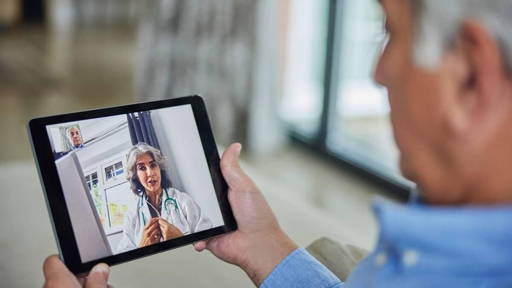The Amsterdam UMC conducted research into experiences with video consultations as an alternative to physical visits to the hospital. The VIDEOGO trial specifically looked at the process leading up to major abdominal surgery. Both patients and healthcare providers agree that video consultations offer many advantages. Patients save an average of two hours in travel and waiting time per consultation and also incur lower costs for travel and parking to and at the hospital. Partly as a result, a video consultation is much more sustainable, with 99 per cent less CO₂ emissions.
Telephone and video consultations have been an option for many years, but during the coronavirus pandemic, their use increased exponentially, largely due to the contact restrictions in place at the time. It was one of the few ways in which regular healthcare could be maintained to some extent. Even during the coronavirus pandemic, it was concluded that video consultations should remain a permanent fixture in the future. After the pandemic, video consultations remained widely available, but within the Amsterdam UMC, it was found that despite the advantages, many healthcare providers were not yet using them.
Research into the use of video consultations
The university hospital therefore decided to launch a study to identify the potential barriers, advantages and disadvantages and to determine the effectiveness of video consultations, what patients think of them and why not all healthcare providers are using them yet.
The VIDEOGO trial was launched for this purpose. The aim was to find out whether a video consultation works just as well as a physical consultation in preparing for major abdominal surgery. "Do patients receive the same amount of information? Do they feel they are receiving the same level of support? Does it work for all ages and for people with different digital skills? And how do surgeons experience it?" explains physician-researcher Britte ten Haaft.
Only advantages
The results of the VIDEOGO trial send a clear message: video consultations are a fully-fledged alternative to physical consultations with surgeons. In the randomised trial, conducted in two Dutch hospitals among 112 patients undergoing major abdominal surgery, traditional and digital forms of consultation were systematically compared. No difference was found between a physical and a video consultation. Information processing, satisfaction and the quality of the consultation were rated positively by patients and healthcare providers.
More importantly, the conclusion is that video consultations offer significant advantages over physical consultations. The elimination of travel and waiting time, lower transport and parking costs, and less need for accompaniment to the hospital results in an average time saving of two hours per consultation. For patients, this not only means greater convenience, but also more control over their own care process. At the same time, the use of video consultations contributes to a more efficient organisation of healthcare capacity.
Sustainable and inclusive
The social benefits are just as relevant. According to the researchers, the CO₂ emissions of a video consultation are 99 per cent lower than those of a physical visit to the hospital. This is an important factor in a sector that is responsible for approximately 7 percent of total emissions in the Netherlands. ‘For patients who live far away or have no transport, physical consultations can sometimes be an obstacle. Video consultations can remove that barrier and contribute to making healthcare more sustainable,’ says Britte ten Haaft, who emphasises the importance of accessible and sustainable healthcare.
Professor of Surgery Marc Besselink also sees practical advantages in video consultations: ‘Patients like to receive information at home, in a familiar environment and with their loved ones around them. Sharing images, such as CT scans, is also easy online.’
For Professor of Digital Health Marlies Schijven, video consultations are a natural step towards future-proof healthcare: ‘They offer a valuable expansion of the options for contact. It is important that healthcare providers know that video consultations are a safe and effective option. In practice, it works very simply: patients indicate their preference, and the healthcare provider acts on that preference where possible.’
The results of the VIDEOGO trial have now been published in The Lancet Digital Health. The study was conducted at the outpatient surgery clinics of Amsterdam UMC and Catharina Hospital and funded by ZonMw through the Citrienfonds programme.







